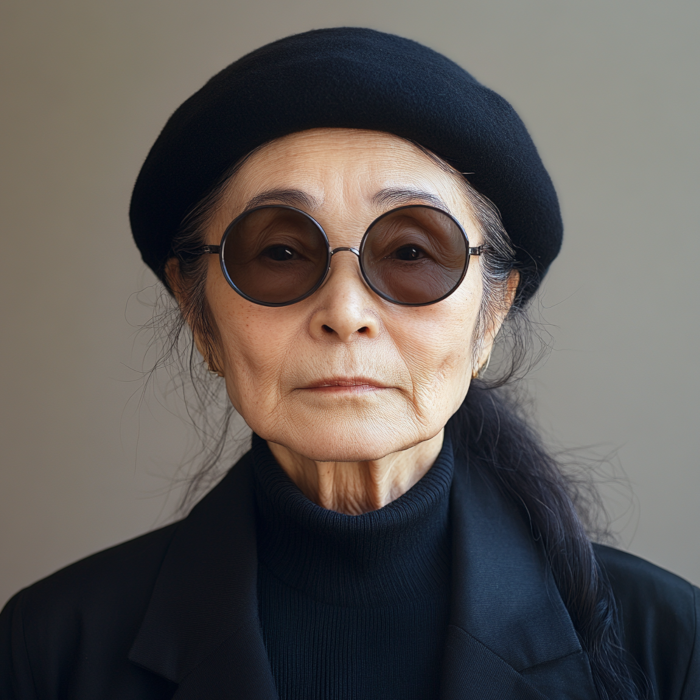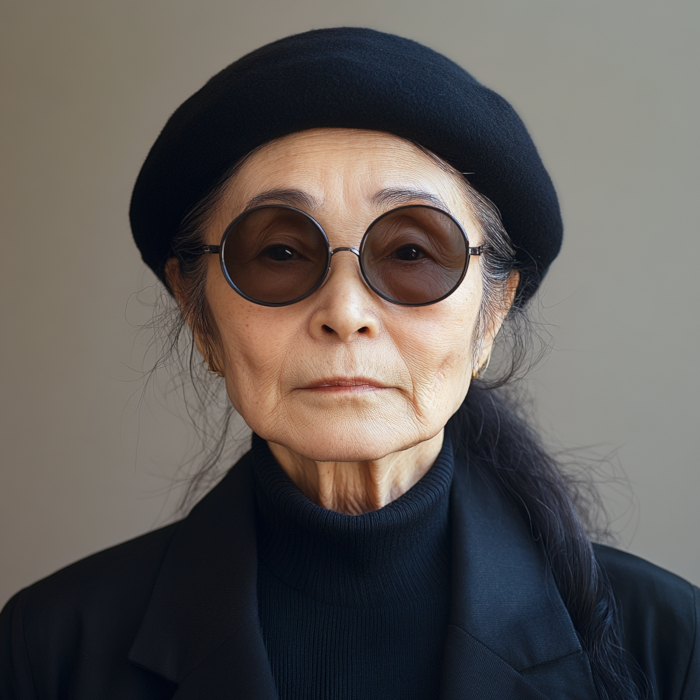


Yoko Ono (born February 18, 1933) is a Japanese multimedia artist, singer, songwriter, and peace activist who is best known for her avant-garde art, her marriage to John Lennon of The Beatles, and her contributions to the peace movement. Ono’s work spans various forms of media, including performance art, visual art, music, and filmmaking. She has been a significant figure in the avant-garde art world since the 1960s and remains an influential and often controversial cultural icon.
After the war, Ono attended Gakushuin University in Tokyo, where she studied philosophy. In 1953, she moved to the United States, enrolling at Sarah Lawrence College in New York. It was during her time in New York that she became involved in the city's avant-garde art scene.
Early Avant-Garde Art: Yoko Ono quickly became a prominent figure in the avant-garde art community in New York. She was associated with the Fluxus movement, an international network of artists known for blending different artistic disciplines and challenging traditional art forms. Ono’s work often blurred the boundaries between artist and audience, inviting interaction and participation.
Performance Art and Conceptual Art: Ono’s early work included groundbreaking performances and conceptual art pieces. Some of her most famous works from this period include:
Meeting and Collaboration: Yoko Ono met John Lennon in 1966 at an art gallery in London, where she was preparing an exhibition. They quickly formed a close personal and creative partnership. Their relationship was highly publicized and often controversial, with Ono being unfairly blamed by some fans for the breakup of The Beatles.
Marriage and Activism: Ono and Lennon married in 1969 and became famous for their peace activism, most notably their "Bed-Ins for Peace" during their honeymoon, where they invited the press to their hotel room to discuss peace rather than engage in traditional wedding celebrations. Their song "Give Peace a Chance" became an anthem for the anti-war movement.
Musical Collaborations: Ono and Lennon collaborated on several musical projects, including the Plastic Ono Band, which was experimental in nature and fused rock music with avant-garde elements. Ono’s music, which often featured her unique vocal style and non-traditional structures, was both influential and polarizing.
Solo Music Career: After Lennon’s assassination in 1980, Yoko Ono continued her music career, releasing several albums that garnered critical acclaim. Her music, which had always been experimental, began to gain more appreciation in the 1980s and 1990s, particularly with the rise of alternative music and feminist movements.
Visual Art and Exhibitions: Ono continued to create visual art and stage exhibitions worldwide. Her work often explores themes of peace, love, and human connection, as well as the experiences of women and marginalized groups.
Cultural Influence and Advocacy: Ono has remained a vocal advocate for peace, women’s rights, and social justice. Her influence extends beyond the art world, as she has been an enduring figure in popular culture and activism.
Honors and Recognition: Over the years, Ono has received numerous awards and honors for her contributions to art and music, including the Golden Lion for Lifetime Achievement at the Venice Biennale in 2009. Despite the early criticism she faced, particularly during her time with Lennon, she is now widely recognized as a pioneering artist whose work has had a lasting impact.
Yoko Ono has often been a polarizing figure. During her marriage to Lennon, she faced intense scrutiny and often harsh criticism, particularly from Beatles fans who unfairly blamed her for the band’s breakup. Over time, however, perceptions of Ono have shifted, and she has been increasingly acknowledged for her artistic contributions and her role in John Lennon’s later work.
Yoko Ono’s legacy is multifaceted. She is a pioneering figure in the worlds of avant-garde art and music, a dedicated peace activist, and a symbol of artistic freedom and innovation. Her work continues to inspire new generations of artists and activists, and her influence is evident in the fields of conceptual art, performance art, and experimental music.
Ono’s ability to challenge norms, provoke thought, and engage audiences in new ways has secured her place as one of the most important and influential artists of the 20th and 21st centuries. Despite the controversies and challenges she faced, she remains a powerful voice for peace and creativity in the world.

We use cookies
We use cookies and other tracking technologies to improve your browsing experience on our website, to show you personalized content and targeted ads, to analyze our website traffic, and to understand where our visitors are coming from. Privacy Policy.